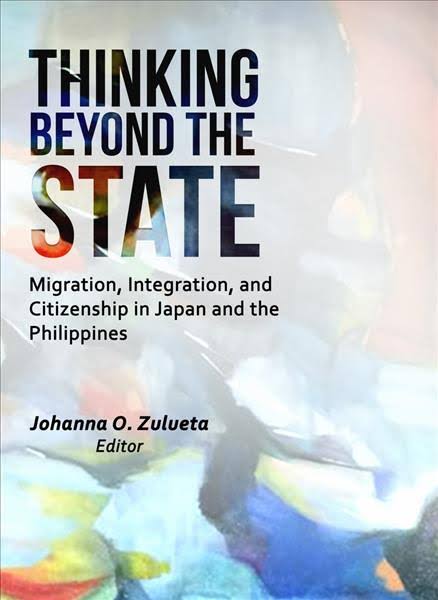Sunshine across the sea?
Johanna O. Zulueta (ed.) 2018.
Thinking Beyond the State: Migration, Integration, and Citizenship in Japan and the Philippines
Manila: De La Salle University Publishing House and Brighton: Sussex Academic Press
ISBN 9789715556569
Mistaken by the book's title, I expected to review a comparative study. The subject matter, however, is Filipino migration to Japan in contemporary times, and the complex issues this entails. It is this entanglement that is hinted at in the idea of 'thinking beyond the state' as, until recently, studies of migration were held hostage by the role of the state and its policies in the process. With the shift to transnational approaches, however, other actors, such as the migrants themselves, migrant organizations and networks, came to the fore. Consequently, in the present collection of contributions, migrant agency receives its due.
The editor/contributor, Johanna Zulueta, introduces the subject matter with lucid, albeit very condensed, observations on the complicated questions the book addresses, at the same time she provides the reader with historical data about the movement of people between Japan and the Philippines. In this regard, we are informed that, as of December 2016, Filipinos –almost a quarter million of them – rank as the third largest group of immigrants, next to Chinese and Korean nationals. In contrast to this stood the then mere 17,021 Japanese nationals in the Philippines.
With their focus on the experiences of Filipino migrants, the nine author-contributors present us with the wide range of pressing issues these migrants are facing. In doing so, the limits of state-centric discourses become obvious, and by 'thinking beyond it', the various authors problematize contemporary migration processes. Substantially, their contributions have been thematically divided into three main parts – Challenges to Policies; Agency in Structure; Communities and Integration.
The challenges consist of a review of immigration policy in contemporary Japan; the policy failure of the Japan–Philippines Economic Partnership Agreement regarding the healthcare workers' migration scheme, which notes the low passing rate of Filipino nurses in the national licensure examinations; the issues and concerns of Filipino domestic workers to Japan; and the impediments on reaching human security for migrants. From the very titles, it is already obvious that all these contributions can recommend no more than utopian policy solutions.
The part on agency highlights migrants decision-making regarding staying in or leaving Japan; issues of child upbringing and citizenship of the offspring of mixed marriages; the perspectives of Japanese-Filipino youth, while noting the importance of Japanese nationality as cultural capital; and how Filipino rap music by Japanese-Filipino youth can serve as a strategy for visibility and acceptance.

The last part relates the role of Migrant Support Organizations in the process of migrant integration through social bonding, bridging and linking; and the inflow of and its consequences for Filipinas working as entertainers in the big city, highlighting the role of the Filipino Migrant Center in facilitating communication with other, often undocumented, Filipino migrants, the locals, and the local administration.
Whereas the editor claimed that Japan–Philippines migration is well and alive as an object of interdisciplinary study, she also points to subjects that have so far eluded attention, such as aging Filipino migrants, Filipino entrepreneurs and highly skilled migrants in Japan, Japanese educational migrants and Japanese retirement migration to the Philippines. As the latter drew my attention as missing, I inquired about the result of the Philippine Retirement Authority's long-standing effort in attracting Japanese retirees. The result is not world-shaking, as the Philippine Retirement Authority informed me that a mere 2,223 Japanese retirees had currently availed themselves of the privileged Special Resident Retiree's Visa status (March 2019).
Be this as it may, I still quote Professor Mina Roces's prefatory observation, “This is a very important seminal study that will be a major contribution to the robust field of Filipino migration studies. In addition, the research findings have implications for future policy-making and underscore the need for transnational approaches to migration that, as the book's title suggests, ‘think beyond the state’” (p.xii).
Niels Mulder, Independent scholar, the Philippines